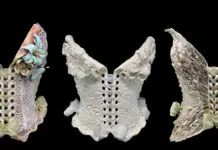Peter Rudy had a colorful career leading up to his current gig as editor of the popular website, Oklahoma Watchdog. Rudy, a native New Yorker, got his start in journalism at an Arizona radio station. In 2006, he landed at Oklahoma City’s KTOK radio as state Capitol reporter. That made him a good fit to become communications director for the nonprofit Oklahomans for Responsible Government. When OFRG folded in December 2010, Rudy became editor of Oklahoma Watchdog. Rudy and his wife Debbie live in Norman.
Oklahoma Magazine: Your organization’s name says a lot. Would you describe Oklahoma Watchdog as primarily a news service or a provider of analysis and commentary?
Peter Rudy: I think of it as an investigative reporting website that focuses on the waste, fraud and corruption in the state. I’ve also kind of moved it. I go to legislative hearings. I tweet live. A lot of people are at work and can’t be at the Capitol at all these meetings, so I provide live coverage for them.
OM: Watchdog has a website and blog, Facebook page and Twitter feed. Which medium do you consider most important to what you are trying to accomplish?
PR: That’s a good question. You have to treat it as totally different audiences. Generally, people following me on Twitter want to know what is going on right now at the state Capitol. Facebook is a totally different segment. If I had to pick one, I suppose it would be the website, because that is the repository of all of the information. But it is kind of a three-legged stool. Not having any one of those would really make it hard for things to hold up.
OM: How important has social media become to news reporting?
PR: Social media is the place to go. You’re seeing not just Oklahoma Watchdog but also many news organizations going that way. It’s the most immediate way to get information. Like in January, at the first State Board of Education meeting, which was quite contentious between (newly elected state Superintendent Janet) Barresi and school board members. I was there and was the first journalist to let people know that there was something contentious going on.
OM: What is a recent example of something you have uncovered in your news reporting that you consider important?
PR: The one that has gotten the most attention, back in June, was when I attended a meeting of the Human Services Commission, which oversees DHS, and they went into a closed session. When they came out of closed session, they didn’t vote to come out of closed session, and they didn’t vote to adjourn, they just left. I was the only person to witness that, so it was an exclusive story.
OM: What was the significance of that?
PR: If any votes were taken, say on a legal situation, they do need to publicly state that when they come out of closed session. If there were decisions ever made in closed session, it would seem to me, based on that one meeting, that they never made those publicly known.
OM: With an associate’s degree in forestry you ended up with a career in journalism. How did you get your first break into journalism back in the 1990s?
PR: I was living in Flagstaff, Ariz., and working at a hotel and just basically made friends with some folks who were working at a radio station. They had a need for a weekend overnight disc jockey. I started board operating at the news/talk station, and gradually moved up through the process to become program director and have my own talk show. From there it was just moving up to greater markets. It has been a long, strange trip, that’s for sure.

























